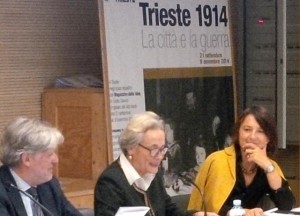EVENTS The Value of Memory
The international conference entitled, “Memory and the Loss of Property,” was held in Trieste last week as part of the activities of the “Laboratorio permanente sulla Memoria e sull’uso della Storia” (The Permanent Workshop on Memory and the Use of History). The center, supported by the provincial administration in accordance with the municipality, the Department of Humanities of the university of Trieste and the Jewish community is devoted to promoting and deepening the reflection on historical themes, with a special interest of the twentieth century. This is a long-term project which aims to reaffirm the centrality of Trieste not only as a meeting place for all minorities, but also as a place for reflection and knowledge of those who have suffered, seeking to return to the Adriatic city – the capital and meeting place of minorities in Europe – a sense for history and memory.
After the first conference, organized by the Laboratorio in 2013 and titled “History and Memory”, dedicated to the relationship between individual memory and its historical reinterpretation, the focus of the two day conference at the “Magazzino delle idee” (Warehouse of Ideas) was on the value of memory and as explained by the subtitle of the meeting on “Memory and the Loss of Property”. This second conference focused on the relationship between people and objects, as well as the destruction of personal property rendering its victims not only poorer but also without roots and making them feel unstable. All this coincides with the policies of extermination and exile along with historical and economic strategies whose goals were dispersion and displacement.
Professor Giacomo Todeschini of the University of Trieste represents the many organizations that support the initiative. Professor Todeschini explained that the conference was about, “How we remember the loss of personal belongings, homes, objects small or large that are part of the story of person or group”. “And, he said, “the organizers meeting in the Laboratorio wished to emphasize that ‘loss’ must not only be remembered to better understand the meaning of an experience but it also stimulates the memory of what has been, and of what we believed it has been. Often it can revive the hope of being able to restore the past, or to recover and rebuild a life.” In addition, such a loss “enables with its violence, the crushing of the identity of those very people at the very moment of their loss”.
The object of the conference relates as well to the huge mass of people migrating due to wars, violence and poverty in the past few years. We also must keep in mind the increasing impoverishment experienced in recent years by a large part of the population that lives in the “first world”. Western Europe, North America, England, Italy and Germany have become impoverished places in which many are deprived of a minimum well-being as a result of the violent dynamics of contemporary economic policies, which only appear to be less harsh and bloody than war.
Professor Todeschini continues: “International organizations and prestigious economists have been pointing out for a long time the danger of this exponential growth of inequality” and the issue of the loss of property. All this is addressed in the conference along with the different interpretations of the “value of memory” from a plurality of points of view, both substantial and methodological.”
The first session was devoted to the problem of Jewish property; lost and not returned, i.e. to how the existence of the Jews as a people and as a group have been marked by losses which have modified the essence of Jewish identity and has lead to legal and political conflicts. Anna Foa, Mario Toscano and Michele Sarfatti participated in this session and were followed by another on the Istrian exodus.
Other historical, sociological, psychological, psychoanalytical, and political approaches have been part of sessions led by Sari Nusseibeh on “Memory: the Israeli-Palestinian conflict,” or by Silvia Amati Sas on “Artifacts and Anthropogenesis. The memory of objects from an anthropological perspective”, while the art critic Konstantin Akinsha from Vienna discussed “Memory and Stolen Art On the Return of Cultural Property.” On the last session of the two day conference the neuroscientist Konstantin Anokhin of the Kurchatov Institute, Moscow, introduced the perspective of those studying the biological functioning of memory with, “Keepers of Memory: How our Brain Shapes our Cultural Past.”
All the talks, as it has been done for last year conference, will be organized in a publication, that will be ready in time for the next one. So the appointment is in Trieste, for next year’s international conference organized by the Laboratorio della Memoria.

